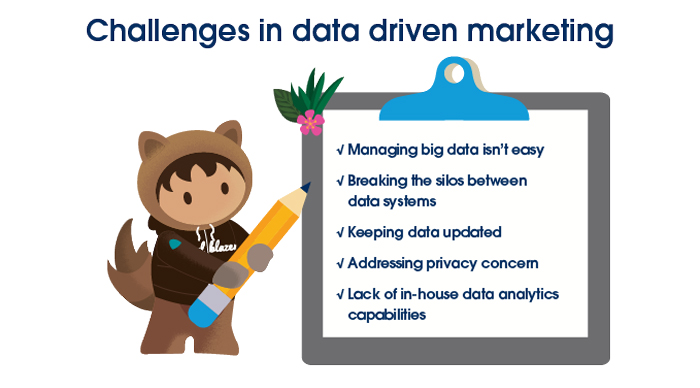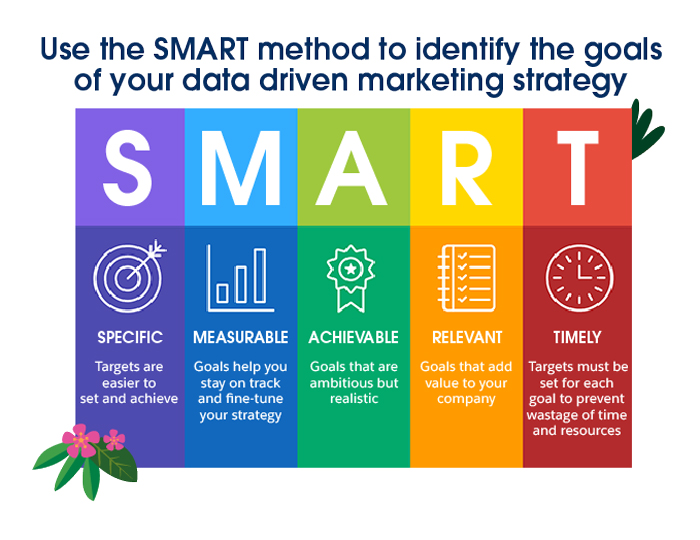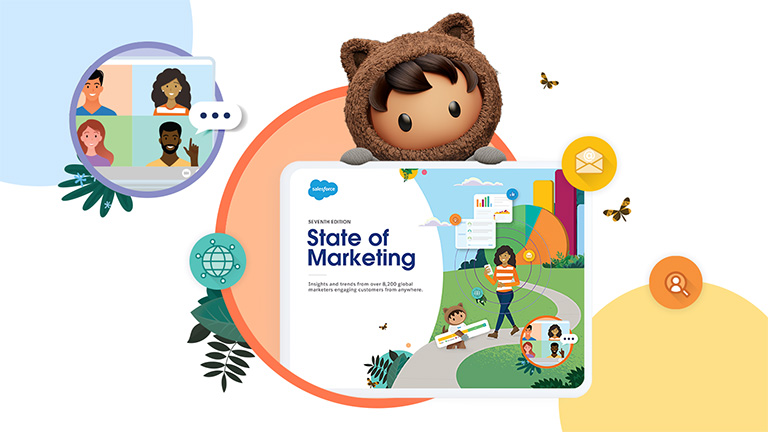Table of Contents
What is data driven marketing?
How data driven marketing is better than traditional marketing
Does data driven marketing spell doom for traditional marketing?
Benefits of data driven marketing
Challenges in data driven marketing
Improve your marketing with these data driven strategies
Introduction
What is data driven marketing?
How data driven marketing is better than traditional marketing
Traditional marketing has three fundamental challenges:
- You have very limited information about your audiences, which means you base your decisions on assumptions and gut feeling
- You resort to trial and error with broad marketing campaigns in the hope of getting more people’s attention
- Sales is the only parameter of your campaigns’ success and does not account for important factors that impact it
Nobody can say with conviction if a marketing or ad campaign is going to be or was successful. Even the sources of data – mostly dated market studies – are unreliable. And with limited measurement of their effectiveness, traditional campaigns produce no new insights about the target markets and audiences, which companies can use to strategise better.
An art supply company that sells products of different grades cannot have a 'one size fits all' marketing strategy when it targets professional painters, art college students, or schools. If it does, the company may end up investing in expensive ad spaces, generic marketing campaigns, etc., with no clear idea of how these will contribute to sales. And this is the downside to traditional marketing - the inability to target people 1:1.
Data driven marketing replaces guesswork with hard-hitting evidence. Marketers can drill down to audiences’ specific needs and preferences using data like demographics, digital behaviour, buying patterns, interests, etc. Every new campaign engaged with can yield finer customer data that can help refine future campaigns.
This way, marketers can reach their audiences at the right time and place with the most personalised messages and offers to increase conversion.
Does data driven marketing spell doom for traditional marketing?
Benefits of data driven marketing

1. Understanding your target audiences deeply
2. Segmenting your audiences finely
3. Delivering personalised messaging
4. Creating a seamless omnichannel experience
5. Targeted ad buying
6. Improve marketing ROI
Challenges in data driven marketing

Some of the most common challenges in data driven marketing are:
- Collecting massive amounts of data: Without the right tools, collecting and managing big data can be extremely difficult and cause marketers to miss out on the benefits of data driven marketing.
- Unifying data: It is also vital to break the silos between different data systems to make full sense of it all.
- Staying up-to-date: Customer behaviour is in a state of constant flux, which means even if your tools collect data in real-time, it might be outdated by the time you process and interpret it. So, the ability to analyse data in real-time is just as crucial for effective marketing.
- Privacy concerns: Many countries have passed data privacy laws restricting the collection and storage of customer data without consent. Companies need to take adequate steps to ensure they ethically collect and use customer data.
- In-house data analytics capabilities: To analyse and leverage your data, you may need experts with the right skills to put data to optimal use.
Data driven marketing trends
Data is the new currency and the most valuable one at that. The black swan event of 2020 triggered a massive move to digital as people were forced to stay indoors due to pandemic-related restrictions. Both consumers and businesses adopted digital everything, making data supreme.
Here are some trends that continue to transform data driven marketing:
• AI/ML improve automation and personalisation
Artificial Intelligence’s (AI) USP is converting massive amounts of raw data into comprehensible information in a fraction of a second, something impossible for humans to do. AI's impact across industries and functions, especially marketing, is considerable. It helps marketers make personalised, real-time engagement at scale a reality.
With the application of ML algorithms, marketers can teach AI-based systems to automatically learn from available data and improve over time. This can be used to harness and act on the right data at the right time without manual intervention.
• Predictive analysis keeps marketers agile
• Privacy and security concerns are more important than ever
Increasing data breaches worldwide are leaving customers anxious about where and how their data is used. Data privacy regulations such as GDPR, CCPA, HIPAA require marketers to be more transparent than ever about how they use customer data.
Tech giants like Google have already taken steps to address customers' security concerns by announcing the removal of third-party cookies from websites soon. This poses challenges for marketers that extensively use website cookies to drive personalisation online. As privacy and security regulations tighten, it is becoming more important for marketers to rely on their own data rather than third-party sources. This also needs marketers to enhance their tech stack to perform future-ready data driven marketing.
• Data silos are breaking down
Improve your marketing with these data driven strategies
Using data to drive your marketing outreach enables marketers to put customers at the heart of everything they do and engage them in ways they like. The idea of data driven marketing is to optimise benefits for marketers and rid customers of annoying, irrelevant messages that disrupt their journeys.
Here are a few data driven marketing strategies that can help you improve and personalise customer engagement:
Bring all your data and the entire organisation in one place – This enables you to create cohesive customer journeys across channels and touchpoints. To provide consistent, contextual customer experiences, it is important to unite your brand messaging across functions, not just marketing campaigns.
- Know audience segments to target them better – If the goal is to make marketing more relevant, start by creating well-defined audience segments to address them in ways that suit their specific needs and journeys. For instance, you can use data such as demographics, customers’ digital behaviour, preferred platforms, etc. to segment your audiences. You can further refine these segments based on things like their level of engagement.
- Perfect your content – Analysing data can reveal finer nuances about your audiences’ behaviours and personalities. This will help you craft and refine your content across platforms, making it extremely useful and engaging.
- Better understand buyer personas – Use data like browsing history, past purchases, content engagement, etc., to create more comprehensive buyer personas. All this allows you to reconnect with and remind your audience about the brand in the right moments and channels to prompt action. For example, you can display targeted ads on social media to a recent website visitor, or send an existing customer abandoned cart emails to nudge them towards making the purchase.
- Unify the customer experience – Customer journeys are becoming increasingly intricate, making it imperative for companies to develop the capabilities to recognise and engage their customers regardless of the channel used. An omnichannel strategy based on unified data from across channels and teams can streamline broken customer journeys to bring down churn rates.
- Determine the best time for promotions – Historical data can help you with the times of the year, month, or day when engagement with promotional campaigns peaks. This can help you optimise the duration and timing of your promotional campaigns.
To make the most of your data driven marketing strategy, you need to clearly define its goals.

Data driven marketing tools
Marketers today need data driven tools to do what they do, only better. Using data driven tools can help them gain an edge and better connect with their audiences. There are a number of marketing tools and technologies that provide basic to advanced features. Salesforce Marketing Cloud is one of the best marketing tools available in the market currently. It can take care of your end-to-end data driven marketing needs – from gathering rich customer data and building visual connected customer journeys, to publishing campaigns and breaking down the factors that affect the success of all your marketing campaigns - all in one place.
Marketing Cloud is powered by an in-built AI engine called Salesforce Einstein. Einstein powers all of Marketing Cloud’s data analysis and predictive capabilities. With a feature set that offers Datorama, CDP, Interaction Studio, and much much more, Marketing Cloud enables marketers to really listen to what their customers are saying, safely manage their data, and build one-to-one customer experiences across touchpoints.
Examples of data driven marketing
If you are overwhelmed with data driven marketing ideas and are not sure where to start, here are a few examples that can give you a leg-up:
Paid search: Note keywords your customers are searching for, identify those you want to rank for and run paid ads for them. Your ads will appear at the top of the search results when your target customer looks for that keyword. You can even bid for your competitor's name so that your ad shows up when someone searches for your competitor.
Lookalike audience: Facebook, LinkedIn, and Google Ads let you create lookalike audiences who share similar characteristics with your existing audience segments. This way, you can widen your net and reach more people who will likely engage with your content and become your customer.
Drip marketing: Email automation can enable drip campaigns – emails that get sent to customers at a specific time and sequence based on the customer journey stages and the actions they take. You can customise these emails with contact names, references to their previous actions, etc. Drip campaigns are particularly effective for course reminders and cart abandonments.
Final thoughts
The key to effective marketing is making the customer feel they are being engaged meaningfully through a personal, one-to-one conversation; not like they are being marketed to.
Data driven marketing does just that.
With personalisation that is timely and relevant, data driven marketing guides customers to purchase instead of pushing, and ultimately repelling them. With frequent ground-breaking developments in AI and big data, the case for data driven marketing is only set to get stronger. Data driven marketing is the future, and marketers would do well to adopt it before it's too late.
Have you heard of Salesforce Marketing Cloud?
Marketing Cloud enables data-first marketing that helps marketers build customer relationships for life. It lets you build a 360-degree customer view by pulling in data from multiple sources. You can then use this consolidated view to connect with your customers at the right time, using the right messaging, on any channel.
Supported by a powerful AI engine, Einstein, Marketing Cloud can enable data analytics to surface deeper customer insights that help you connect with customers more meaningfully and optimise your marketing efforts.




